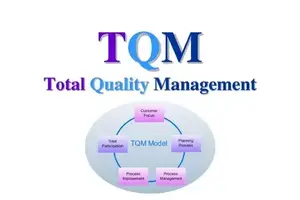Total Quality Management (TQM) Course in Lahore
What is your definition of quality? Quality means different things to different people. The Total Quality Management Course in Lahore begins by explaining multiple definitions of quality, such as fitness for use, conformance to specifications, reduced variation, consistency, and meeting or exceeding customer expectations. This approach helps learners understand quality from both customer and organizational perspectives.
There is a common misconception that quality always costs money and that higher-quality products are more expensive than lower-quality ones. In reality, Deming’s chain reaction demonstrates how improving quality reduces waste, increases productivity, and lowers overall production costs. As a result, organizations become more competitive, ensure long-term survival in the market, and create sustainable employment opportunities.
Goal of Total Quality Management
The Goal of total quality management is to hold all parties involved in the production process accountable for the overall quality of the final product or service. Total quality management is a structured approach to the overall management of an organization. The focus of the process is improving the quality of the organization’s outputs, including goods and services, through continuous improvement of internal procedures.
Total Quality management (TQM)
Total quality management (TQM) is the continuous process of detecting and reducing or eliminating errors in production, streamlining supply chain management, improving the customer experience, and ensuring that employees are trained in a timely manner.
Standards set as part of a TQM approach can reflect both internal priorities and any currently applicable industry standards. Industry standards can be defined at multiple levels and may include compliance with various laws and regulations governing the operation of a particular business. Industry standards can also involve making items according to an understandable standard, even if the standard is not supported by official regulations. The history of TQM often goes back to the early 20th century, when Walter A. Shewhart introduced modern quality control. In 1931, Shewhart presented a seminal piece of industrial work entitled Economic Control of Manufactured Product Quality. This exposure is considered one of the basic principles of production quality control.
Burraq Engineering Solutions Institute’s Total quality management Certification courses are designed to provide you with the skills and information needed to improve your quality management procedures and the effect you have within your business.
Course Details
- Introduction to TQM
- Fundamentals of Quality and TQM
- Functions of TQM
- Daily Management and Policy Management
- SWOT Analysis
- 5S and Visual Management
- Customer Focus
- Employee Involvement & Empowerment
- Process Management
- Cost of Quality
- Business Excellence & Quality Management Models
- Total Quality Leadership
- TQM Implementation
- Methods & Tools for Total Quality
- Voice of Customer (VOC)
- Problem Solving Tools and Techniques
- Conceptual Framework to Implement TQM
- An Overview on QMS ISO 9001:2015
- National and International Quality Awards

Total Quality management (TQM)
- Rs 35,000/-
- Course Duration 1 Month
- Online Session
- On Campus Lecture + Practical
- Video Lecture Available
- Urdu & English
- 24/7 Support
